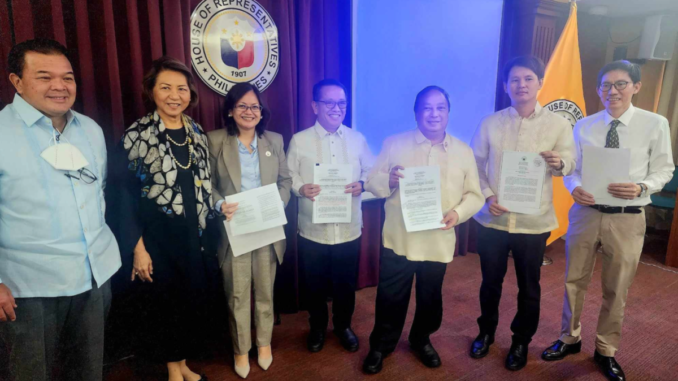
THE Philippines, with its rich biodiversity and vibrant culture, faces significant challenges in terms of climate change and energy sustainability. In February 2024, the Swiss Re Institute predicted that typhoons and floods would result in annual economic losses equivalent to 3 percent of our gross domestic product. As a nation highly susceptible to extreme weather events, rising sea levels and other climate impacts, the need for effective climate legislation is urgent.
On August 6, the House Committee on Climate Change, led by Rep. Edgar Chatto, approved the Low Carbon Economy Investment Act of 2023. This landmark bill provides a framework for achieving decarbonization while stimulating economic growth.
Considered to be the first in the world, Rep. Jose Manuel Alba, chairman of the technical working group, shared: “Beyond the usual legislation, our version of low carbon economy seeks to influence corporate behavior to pursue low carbon investment agenda, not only as a pathway for regulatory compliance — but more importantly, to see it as an opportunity for cleaner, greener and greater economic prosperity for our country.”
(From left) Representatives Steve Solon (Sarangani), Jocelyn Limkaichong (Negros Oriental), Anna Veloso-Tuazon (Leyte), Joeman Alba (Bukidnon), Edgar Chatto (Bohol), Christian Tell Yap (Tarlac) and Climate Change Committee Secretary Rommel Reyes. PHOTO FROM REP. JOEMAN ALBA
During the Philippine edition of Unlocking Capital For Sustainability (UCFS) 2024, Rep. Anna Victoria Veloso-Tuazon, a bill co-author, stated in her opening keynote, “The economic cost of inaction is apparent, estimated at P645 billion per year across [vital] sectors which include energy, transport and communications. In establishing a whole-of-nation and whole-of-society approach to low carbon, the bill should be viewed alongside other policy instruments such as the National Adaptation Plan and the Nationally Determined Contribution Implementation Plan.”
Eco-Business organized the UCFS 2024 event, themed “A new nexus for energy and nature in the Philippines,” in partnership with the United Nations Environment Programme Finance Initiative. Over 100 policymakers, business leaders and civil society actors attended, including this author.
The Low Carbon Economy Investment Act of 2023 aims to establish a clear direction for reducing greenhouse gas emissions while promoting sustainable economic growth. It seeks to attract investments in renewable energy, improve energy efficiency and support green technologies. The act also encourages public-private partnerships by fostering collaboration between the government and private sector for funding climate initiatives and infrastructure development.
While fossil fuels such as coal and gas continue to dominate the energy landscape in the Philippines at 77 percent (2023), it is imperative that the country transitions to a low-carbon economy to fulfill its climate commitments under the Paris Agreement and meet national targets for reducing greenhouse gas emissions.
One of the panelists, Heng Dean Law, managing director of Pollination Singapore, however, emphasized that despite its heavy reliance on coal, the Philippines has the potential to take the lead in the region’s energy transition.
Preparation for climate impact
The Low Carbon Economy Investment Act encourages significant investments in renewable energy projects, which can greatly reduce the consumption of fossil fuels. It supports the Philippine Energy Plan 2023–2050 targets, aiming for 35 percent renewable energy in the national power generation mix by 2030 and 50 percent by 2040.
Decarbonization is not solely about emission reduction; it also involves preparing communities and ecosystems for the impacts of climate change. The proposed act includes provisions for enhancing climate resilience through sustainable infrastructure development, ecosystem protection and disaster risk reduction measures.
The Low Carbon Economy Investment Act of 2023 presents a promising framework for the country to simultaneously address decarbonization and stimulate economic growth. Through investments in renewable energy, improved energy efficiency and an inclusive transition, the act can help the Philippines fulfill its climate commitments while promoting job creation and economic diversification.
The benefits of this legislation extend beyond environmental protection. It also encompasses social equity and community resilience. With the Philippines facing significant climate threats, successfully implementing this act is crucial in shaping a sustainable future for the nation.
Among Asean nations, the Philippines is the only country that has not declared a net-zero target. However, to ensure the Philippines’ resilience and prosperity in the face of climate change, it is crucial for the government, private sector and civil society to work together to build a low-carbon economy that benefits everyone. Continued dialogue, strategic investments and collaborative initiatives are key to achieving these goals and navigating the challenges of transitioning to a new economy.
The Philippines has the opportunity to not only mitigate the impacts of climate change but also to create a more equitable and sustainable society. This would ensure the well-being of our people and the preservation of our unique natural resources for generations to come.
The author is the founder and chief strategic advisor of the Young Environmental Forum and a director of Climate Tracker Asia Inc. He completed a climate change and development course at the University of East Anglia (United Kingdom) and an executive program on sustainability leadership at Yale University (USA). You can email at [email protected].


Be the first to comment